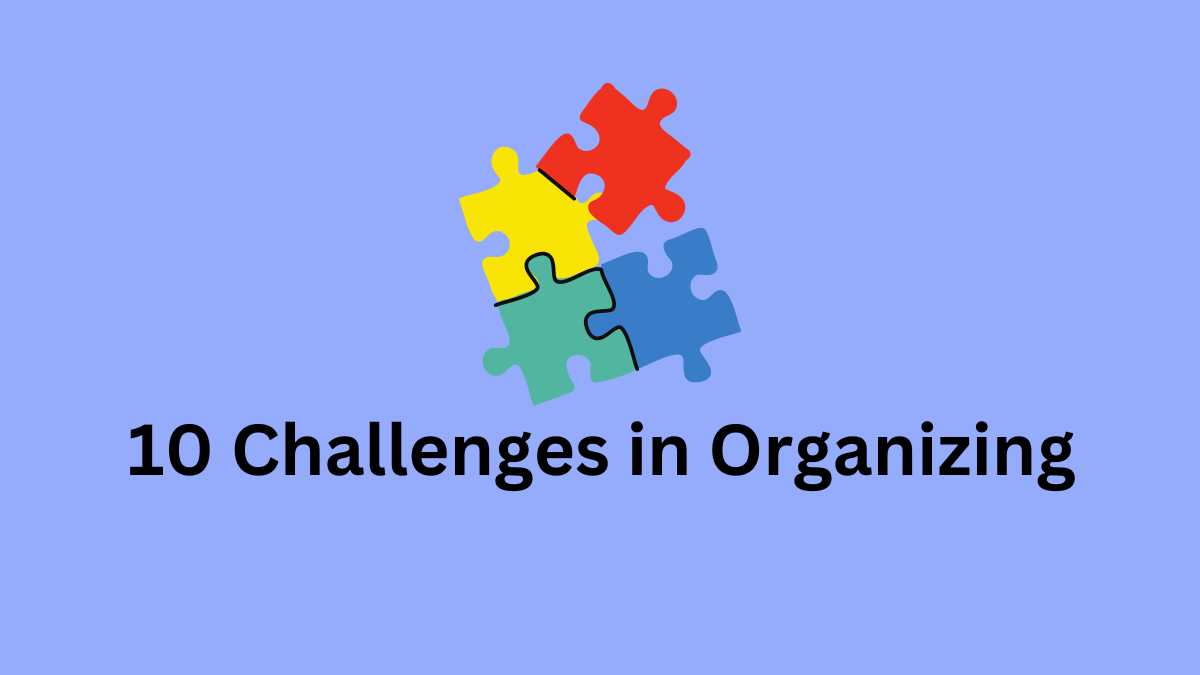Challenges in Organizing
Organizing within an organization involves structuring tasks, resources, and people to achieve specific goals efficiently. However, various challenges can arise in the organizing process, impacting productivity, communication, and overall effectiveness.
In this article, we will explore 10 common challenges in organizing and strategies to overcome them:
Poor Communication
Inadequate organizational communication can lead to misunderstandings, delays, and inefficiencies. It can also hinder collaboration and coordination among teams and departments.
Overcoming Strategy: Implement regular communication channels such as team meetings, email updates, and intranet platforms. Encourage open dialogue and active listening to ensure everyone is informed and aligned with organizational goals.
Lack of Clarity in Roles and Responsibilities
When employees are unsure about their roles or responsibilities, it can lead to duplication of efforts, conflicts, and lowered productivity.
Overcoming Strategy: Clearly define job roles and responsibilities, outlining expectations and accountabilities for each position. Regularly review and update job descriptions to reflect evolving organizational needs.
Resistance to Change
Resistance to change is common in organizations, whether it’s due to fear of the unknown, loss of control, or skepticism about the benefits of change.
Overcoming Strategy: Foster a culture of adaptability and innovation by involving employees in the change process. Provide training, support, and clear communication to help employees understand the reasons for change and how it aligns with the organization’s vision.
Silos and Departmentalization
Silos occur when departments or teams operate in isolation, leading to limited information sharing, duplication of efforts, and decreased collaboration.
Overcoming Strategy: Break down silos by promoting cross-functional collaboration and communication. Encourage interdepartmental projects, joint meetings, and knowledge-sharing sessions to foster a culture of teamwork and cooperation.
Inefficient Decision-Making Processes
Lengthy decision-making processes can impede progress and innovation, resulting in missed opportunities and frustrated employees.
Overcoming Strategy: Streamline decision-making processes by delegating authority, establishing clear decision criteria, and empowering employees to make decisions within their areas of expertise. Encourage a culture of agility and responsiveness to adapt quickly to changing circumstances.
Read More: 10 Challenges in Social Responsibility
Resource Constraints
Limited resources, whether financial, human, or technological, can hinder organizational growth and competitiveness.
Overcoming Strategy: Prioritize resource allocation based on strategic objectives and return on investment. Seek opportunities for cost-saving measures, such as outsourcing non-core activities, leveraging technology, and optimizing workforce utilization.
Poor Time Management
Inefficient time management practices can result in missed deadlines, rushed projects, and employee burnout.
Overcoming Strategy: Provide training and support in time management techniques such as prioritization, delegation, and setting realistic goals. Encourage employees to use tools and technologies to track their time and optimize their workflow.
Read More: 10 Challenges in Organizational Goals Setting
Lack of Accountability
When individuals or teams are not held accountable for their actions or outcomes, it can lead to a culture of complacency and low performance.
Overcoming Strategy: Establish clear performance metrics and expectations for each role, with accountability mechanisms in place to track progress and address any deviations. Foster a culture of ownership and responsibility, where individuals take pride in their work and outcomes.
Workplace Conflict
Conflict among employees or teams can disrupt productivity, morale, and collaboration, leading to negative outcomes for the organization.
Read More: 10 Challenges in Planning in Management
Overcoming Strategy: Implement conflict resolution mechanisms such as mediation, coaching, or structured dialogue sessions. Encourage open communication, empathy, and respect for diverse perspectives to resolve conflicts constructively.
Lack of Leadership and Direction
Without strong leadership and a clear sense of direction, organizations may struggle to navigate challenges, inspire employees, and achieve strategic goals.
Overcoming Strategy: Invest in leadership development programs to cultivate strong leadership skills at all levels of the organization. Ensure leaders communicate a compelling vision, set clear goals, and provide guidance and support to their teams. Encourage leadership accountability and transparency to inspire trust and confidence among employees.
Hence, these are the 10 challenges to organizing in management and strategies to overcome them.
Read Next: 10 Challenges in Decision Making
